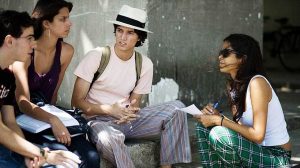Ethnography is the scientific description of the customs of individual peoples and cultures. I have had several opportunities this term to conduct mini-ethnographic research assignments including an oral history project for this class. I have had many valuable takeaways from conducting these mini-ethnographies. One of the most important elements of conducting this type of research is to be respectful of the customs of the group of study. Ethnographic researchers are simply there to observe and record. When drafting the analysis, ethnographers need to be up front about the potential biases that their own opinions can have on their conclusions.
As part of an ethnographic research project for this class, I chose to interview my friend Treeman Baker. Treeman is a senior at Dartmouth from Austin, TX who spent his junior winter working as a business consultant on the largest rice plantation in Nicaragua in a very rural part of the country. During his ten weeks there, Treeman interacted with people across all socioeconomic classes and encountered a variety of different beliefs and cultural practices. Treeman spoke to great length about the business practices in Nicaragua, volunteerism in rural areas, and the differences in culture between Nicaragua and the United States.
I also conducted a linguistic ethnography recently for an anthropology class I am taking this term. I examined the linguistic features and practices of the members of the men’s golf team. I observed them for two days and took notes and tried to remain as neutral as possible in my analysis. At the root of ethnography is making an effort to understand the background of the group or region of study.
The most common practice of ethnography however is participant observation. This can take anywhere from a few days to multiple years. The ethnographic technique involves the researcher assimilating into the society or the group that they wish to learn more about through participating in the activities and practices of the specified group. Oftentimes, the research needs to gain the trust of the members of the community before they open up and provide the researcher with valuable data. Without this level of trust established beforehand, the researcher may have a hard time convincing subjects to cooperate and receive biased responses from those who do. Participant observation also gives the ethnographer a perspective that they otherwise would not have been able to obtain had they not been immersed in the community.
